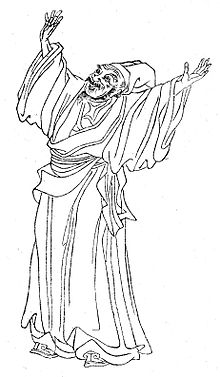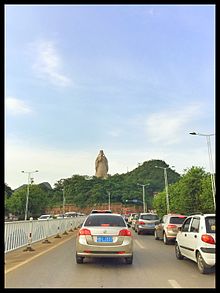Liu Zongyuan
- Machine translation, like DeepL or Google Translate, is a useful starting point for translations, but translators must revise errors as necessary and confirm that the translation is accurate, rather than simply copy-pasting machine-translated text into the English Wikipedia.
- Do not translate text that appears unreliable or low-quality. If possible, verify the text with references provided in the foreign-language article.
- You must provide copyright attribution in the edit summary accompanying your translation by providing an interlanguage link to the source of your translation. A model attribution edit summary is
Content in this edit is translated from the existing Chinese Wikipedia article at [[:zh:柳宗元]]; see its history for attribution. - You may also add the template
{{Translated|zh|柳宗元}}to the talk page. - For more guidance, see Wikipedia:Translation.
Liu Zongyuan 柳宗元 | |
|---|---|
 | |
| Born | 773 Yongji, Shanxi |
| Died | November 28, 819(819-11-28) (aged 45–46) Liuzhou, Guangxi |
| Nationality | Chinese |
| Occupation(s) | Philosopher, poet, politician |
| Liu Zongyuan | |||||||||||||||||||||||||||
|---|---|---|---|---|---|---|---|---|---|---|---|---|---|---|---|---|---|---|---|---|---|---|---|---|---|---|---|
| Chinese | 柳宗元 | ||||||||||||||||||||||||||
| |||||||||||||||||||||||||||
| Courtesy name | |||||||||||||||||||||||||||
| Chinese | 子厚 | ||||||||||||||||||||||||||
| |||||||||||||||||||||||||||
Liu Zongyuan (Chinese: 柳宗元; pinyin: Liǔ Zōngyuán; 773 – 28 November 819) was a Chinese philosopher, poet, and politician who lived during the Tang dynasty. Liu was born in present-day Yongji, Shanxi. Along with Han Yu, he was a founder of the Classical Prose Movement. He has been traditionally classed as one of the "Eight Great Prose Masters of the Tang and Song".
Biography
Liu Zongyuan was born in 773.[1] His courtesy name was Zihou (子厚).
Liu Zongyuan's civil service career was initially successful; however, in 805, he fell out of favour with the imperial government because of his association with a failed reformist movement. He was exiled first to Yongzhou, Hunan, and then to Liuzhou, Guangxi, where he eventually became the city Governor. A park and temple in Liuzhou is dedicated to his memory.[2] His exile allowed his literary career to flourish: he produced poems, fables, reflective travelogues and essays synthesizing elements of Confucianism, Taoism and Buddhism.

He died in 819.[1]
Works

Liu's best-known travel pieces are the Eight Records of Excursions in Yongzhou (永州八記). Around 180 of his poems are extant, of which five were collected in the anthology Three Hundred Tang Poems. Some of his works celebrate his freedom from office, while others mourn his banishment.
One of his most famous poems is "Jiangxue" (江雪), translated into English as "River Snow" or "Winter Snow". The poem has been an inspiration for many works of Chinese painting.
- 江雪
- 千山鳥飛絕
- 萬徑人蹤滅
- 孤舟蓑笠翁
- 獨釣寒江雪
- River Snow
A thousand mountains, no sign of birds in flight;
Ten thousand paths, no trace of human tracks.
In a lone boat, an old man, in rain hat and straw raincoat,
Fishing alone, in the cold river snow.
Liu Zongyuan wrote Fei Guoyu (simplified Chinese: 非国语; traditional Chinese: 非國語, Argument against the Harangues of the Various States), a criticism of Guoyu. In response, Liu Zhang (劉 章, c. 1095–1177); Jiang Duanli (simplified Chinese: 江端礼; traditional Chinese: 江端禮); and Yu Pan (Chinese: 虞槃 fl. 1300), Yu Ji's (虞 集, 1272–1348) younger brother, wrote texts titled Fei Fei Guoyu (simplified Chinese: 非非国语; traditional Chinese: 非非國語; Argument against the Argument against the Harangues of the Various States) in opposition to Liu Zongyuan's essay.[3]
See also
References
- ^ a b Ueki et al. 1999, p. 113.
- ^ "Liuzhou Tourism". Archived from the original on September 11, 2014. Retrieved September 11, 2014.
- ^ Nienhauser, William H. Jr. (University of Wisconsin-Madison). A Third Look at "Li Wa Zhuan". T'ang Studies (Print ISSN 0737-5034, Online ISSN 1759-7633), 2007(25), pp. 91–110. Cited p.: 91-92.
Works cited
- Chen, Jo-shui, Liu Tsung-yüan and Intellectual Change in T'ang China, 773–819, Cambridge: Cambridge University Press, 1992. ISBN 0521419646.
- Nienhauser Jr., William H.; Hartmann, Charles; Crawford, William Bruce; Walls, Jan W.; Neighbors, Lloyd, Liu Tsung-yüan, New York: Twayne Publishers Inc., 1973.
- Ueki, Hisayuki; Uno, Naoto; Matsubara, Akira (1999). "Shijin to Shi no Shōgai (Ryū Sōgen)". In Matsuura, Tomohisa (ed.). Kanshi no Jiten 漢詩の事典 (in Japanese). Tokyo: Taishūkan Shoten. pp. 113–115. OCLC 41025662.
External links
- Liu Zongyuan in Wengu textbase, five poems in traditional Chinese arrayed with Bynner's translation.
- Biography and translations of five poems. (Translated by Tony Barnstone and Chou Ping)
- Works by or about Liu Zongyuan at Internet Archive
- Works by Liu Zongyuan at LibriVox (public domain audiobooks)

- Books of the Quan Tangshi that include collected poems of Liu Zongyuan at the Chinese Text Project:
- Book 350
- Book 351
- Book 352
- Book 353











